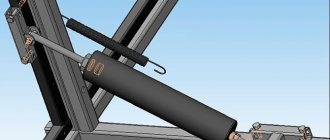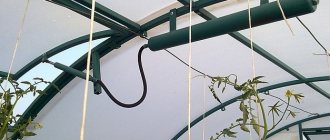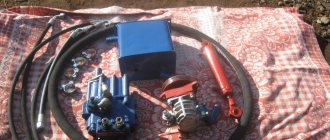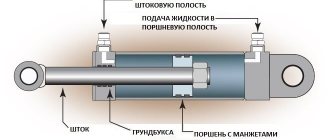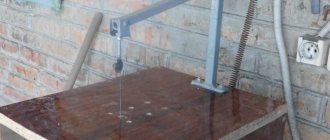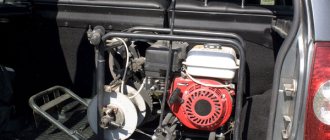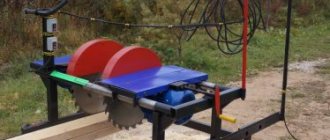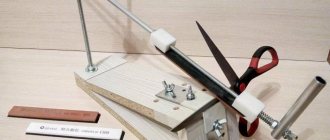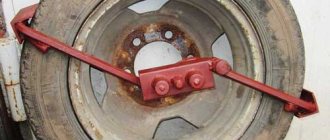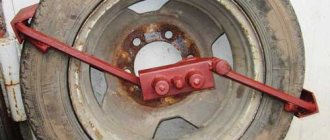Only the lazy have never heard of how the windows into a greenhouse can open on their own in hot weather. An excellent device - a thermal drive for greenhouses - allows you to leave everything for a week with peace of mind and not worry on hot days: who in the house will take care of emergency ventilation of delicate seedlings. But why is it so rare to hear about the use or independent production of thermal actuators for greenhouses? Everything is extremely simple - it’s a kind of paradox: once you tinker with them and make a more or less normal design, you can forget about ventilation altogether. Because a thermal drive is an incredibly reliable and functional device; once it’s manufactured, installed, they don’t think about it anymore!
The “smart” greenhouse opens the windows itself
If watering, heating and ventilation in the greenhouse work on their own, the summer resident does not have to spend 24 hours with his vegetables.
Automation installed in a greenhouse by a zealous owner will leave him more free time. Overheating of plants can destroy all the painstaking work of growing, because the seedlings will simply die. They vitally need timely ventilation. Let's look at how a “smart” greenhouse can open and close the windows independently, without human intervention.
Why do you need a thermal drive?
A greenhouse is installed for specific purposes - to retain heat and protect plants from unfavorable climatic conditions.
However, timely ventilation of the structure is no less important. An automatic ventilator allows you to get rid of excess moisture and reduce the air temperature to the optimum.
This device can be installed on any greenhouse: polycarbonate, glass and film.
If the design is glass, you should be especially careful when choosing a drive, since a glass window has a significant mass and will require a more powerful device to operate it.
In addition, the size of the greenhouse matters. It makes no sense to install this system on a greenhouse whose area is 1-2 square meters. m.
Hydraulic cylinder principle
As you know from a school physics course, any liquid expands and contracts under the influence of temperature. This law can be used to create a device that opens and closes windows. If you place liquid, for example, machine oil, in a sealed hydraulic cylinder, then when the room temperature rises, it will expand and extend the rod. The rod will move the window frame, and ventilation of the greenhouse is ensured. And vice versa, as soon as it gets colder, the oil will return to its original state, the rod will lower, and the window will close.
Hydraulic cylinder
Attention! If the diameter of the cylinder is 50-55 mm, and the length is 50 cm, then 800 g is placed in it. oil (can be used). When the temperature in the greenhouse increases, the rod of such a tool lifts a load of about 10 kg. This may not be one window, but several connected into one system.
Advantages of the method:
- installation does not require electricity;
- it is quite possible to do it yourself;
- The hydraulic cylinder does not require constant maintenance.
Disadvantages of the method:
- the side frame, which rotates along a vertical axis, will not fall under its own weight if the rod is removed. In this case, a return spring will have to be attached to the device.
- if a cold wind suddenly blows, the window will not slam shut at that very moment. Closing will occur after 15-20 minutes when the oil has cooled.
A hydraulic cylinder for a greenhouse can be purchased in a store or made by yourself
Scope and functions
The scope of application is not limited to the growing season. During the summer months, it guarantees accurate and timely ventilation of the greenhouse from any lining. In winter, this device is perfect for installation on a heating system, if one is provided in a greenhouse or greenhouse. In this case, the main task will be to maintain the established temperature regime of the soil and climate.
The task of the greenhouse is to maintain a suitable microclimate for the successful growth and formation of vegetable crops. To successfully grow high-quality products, gardeners are obliged to provide maximum comfort to their plants on the site and indoors.
In this regard, the main functions of the greenhouse are distinguished:
- Maintaining the temperature regime, which usually should be at least 20 degrees Celsius;
- Maintaining optimal humidity in the microclimate depending on the type of plant.
Hydraulic cylinder from spare parts for a machine
For vertical vents, a mechanism assembled from scrap materials is ideal. It is capable of lifting even the heaviest frames, as long as the windows swing open along a horizontal axis. To create it, you need to improve the automobile gas piston.
You will need:
- the hydraulic cylinder itself. Its role can be played by stops for the trunk of Moskvich, Niva, Zhiguli (models VAZ 2108, 2109) or hydraulic cylinders from trucks that lift the cabin;
- epoxy adhesive;
- drill.
Hydraulic cylinder for a greenhouse from a car stop
Stages of work:
- Drill a hole in the bottom of the stop. Be careful and wear glasses when working. Gas escaping from the hole may carry chips into your eyes.
- Using a large diameter drill, increase the hole to 9 mm.
- We press on the rod and push it into the cylinder so that the piston remains at a distance of 30-35 cm from the hole.
- We degrease the resulting cavity with a solvent.
- After the cavity has completely dried, we prepare the epoxy glue for work.
- For greater convenience, the cylinder should be secured in a vice with the hole facing up.
- The piston must be lubricated with oil so that it does not touch the grease-free walls.
- Now let's create a glue plug. Pour glue into the cavity so that it completely covers the hole.
- After the glue has dried, the piston must be moved away by pulling the rod. Since it's oiled, it shouldn't stick.
- In the same place, only in the glue, drill a hole with a diameter of 9 mm.
- We cut threads in it in increments of 1.25 using an M10 tap.
- We strengthen the finished device under the window so that the rod lifts the transom when extended.
Horizontal hydraulic cylinder for greenhouse
Features of use
Remember that the thermal drive is not able to take into account large temperature changes. Its operation will directly depend on how much liquid it contains and how it expands and contracts, if we are talking about this type of thermal drive. It is recommended not to disassemble the mechanism, but to carry out preventive lubrication of the rod from time to time. You can lubricate the rod with regular car engine oil.
- Before installing the drive, you should pay attention to a simple rule. The force of opening and closing windows and doors should not be too high;
- You also need to choose the right location before installation. Typically the top of a window or door is used. It is on this that the mount for the thermal drive is installed. During installation, nothing should interfere with the device;
- All brackets are attached to self-tapping screws using protective sleeves;
- When installing it yourself, please note that the device must be located on the window, but on the other side of the opening;
- All fixing elements must be installed on the thermal actuator spring. It is this that allows the entire opening and closing mechanism to operate.
Hydraulic cylinder from an office chair
If you cannot purchase a car piston, you can use a piston that raises and lowers the seat of an office or computer chair instead. On one side of the unit there will be a plastic valve stem, on the other - a metal one.
Advice. In order to get rid of metal shavings that arose during the alteration process, you need to wash all parts in gasoline.
The hydraulic cylinder is assembled according to the same principle as the previous version.
You will need:
- chair lift cylinder;
- tools.
Why does the manufacturer declare such a load on the thermal drive?
The main parameter for choosing a device is the opening force. The higher this value, the more durable and high quality the mechanism will be. We produce two types of automatic window closers that can withstand loads of 300 and 400 kg.
The declared load parameters are not related to how much weight they lift, because a greenhouse door or window weighs only a few kilograms. This parameter primarily affects the wind loads that the device can withstand. The fact is that the area of the window or door is quite large and a sharp gust of wind can create a large load on the mechanism. To prevent it from being torn out or broken, we make our mechanisms with a large margin of safety.
Do-it-yourself hydraulic cylinder
It's possible that you don't have a car part or a computer chair. Using the same principle, you can make a completely homemade system.
Advice. All connections must be absolutely tight, otherwise the design will not work.
To assemble you need to have:
- any bendable material, for example, polycarbonate or tin;
- plastic pipe;
- sealed chamber, you can use a ball;
- tools.
DIY hydraulic cylinder for a greenhouse
Stages of work:
- We create a container in the form of a cylinder ourselves, using bendable material. Plexiglas can serve as the bottom and lid. We attach it at our own discretion. Some people use tape, but it doesn't last long.
- We make the piston so that it moves freely in the cylinder, but sits tightly. It can be made from metal, plexiglass, wood treated with an antiseptic.
- You need to drill holes in the bottom and cover of the cylinder.
- A deflated rubber chamber from the ball must be placed inside the cylinder under the piston. Connect it to the tube and thread the tube into the hole at the bottom of the cylinder. As soon as the air temperature rises, the ball will inflate and push the piston.
- From the side of the cylinder cover, you need to insert a rod into the hole so that it fits snugly against the piston.
- Air will enter the ball through a tube coming from a separate container, that is, from the receiver. This could be a canister or paint can.
- It is better to pass two pipes through the receiver. One will attach to the ball in the cylinder. The other, spare, will serve for pressure regulation and calibration. It must be closed with a removable plug.
- Attach the rod to the window frame.
Calibration of this version of the device is possible using a free hose. By manually applying pressure, the hydraulic cylinder can be adjusted to respond to a specific temperature.
Device types
Automatic closers have significant differences depending on the method and type of operation. Devices are divided depending on the drive:
- Electrical;
- Bimetallic;
- Pneumatic;
- Hydraulic.
Let's take a closer look at all types of devices.
Electrical operating principle
The design of such a device includes a mechanism that operates from a standard electrical network. The advantages of such a device include high power and the ability to create special climatic and temperature conditions depending on the type of plant and the type of device. Modes can be changed using sensors that are included with some devices. They allow you to monitor temperature, humidity, and it is from them that the signal comes to the main mechanism. The main disadvantage is the dependence on the power source, so for installation you have to run electricity directly into the greenhouse.
Operating principle based on a bimetallic plate
The basis of bimetallic mechanisms is the ability to respond to temperature fluctuations. This is possible through the use of different metals and thermal expansion.
The design consists of two plates that are fastened together. They have different expansion coefficients and, depending on the temperature, one of them increases or decreases in size, which allows the ventilation section to be opened or closed without human intervention.
The main advantage of such a device is absolutely complete autonomy. It has a relatively low price and ease of operation. Among the disadvantages, one can highlight the low power in comparison with the electric mechanism, which will affect the speed of closing or opening the window.
Pneumatic operating principle
The pneumatic operating principle is based on the supply of heated air from an airtight vessel to the drive valve. When heated, air expands, which is then supplied to the valve and the mechanism moves. If the temperature decreases, the reverse process occurs and the valve returns to its original position, closing the ventilation cell in the room.
The disadvantage of such a system is the difficulty of operation. If the structure breaks down, repairs will cause many problems due to the violation of the tightness of the vessel and valve. One of the advantages is the simplicity of the design itself. Together with the hydraulic system, it is quite common on the market of automatic machines for ventilating greenhouses.
Hydraulic operating principle
The hydraulic principle of operation of the mechanism is based on changes in the balance in the weight of two vessels, inside of which there is a special liquid. The design of such a system mainly uses oil, which reacts to changes in temperature. These changes cause vibrations that raise or lower the mechanism due to pressure.
The advantages of such a system include high power in the absence of a charging element or electricity, as well as ease of use and operation of this device. It is the most popular system for closing and opening a greenhouse.
The oil device is a special development of our company. It is necessary for ventilating greenhouses, greenhouses, greenhouses and is very important in gardening for any summer resident. It has a long working life and is designed for at least 100,000 open-close cycles. The body consists of high-strength steel of special quality. Does not require a network connection and is not difficult to operate.
Hydraulic cylinder installation
The last step for any of the three devices is installation. It is recommended to hang hydraulic cylinders from the ceiling, because this is where warm air collects. The device must be protected from direct sunlight, otherwise an overheated device will open the window, and the plants below will be cold. You can protect the hydraulic cylinder with foil or any other material that reflects the sun's rays.
Installing a hydraulic cylinder on a window
The stem can be installed in different ways. For example, nail it to a wooden frame. But then you will no longer open the window manually. Or just place it tightly under the transom.
An automatic ventilation system, the main element of which is a hydraulic cylinder, can be easily made with your own hands. And then the vegetables, berries, herbs or flowers in the greenhouse will not be hot even in the hottest summer.
Automatic for ventilation of greenhouses "Avtovent XL" made in England
The device for automatic ventilation of greenhouses has the ability to adjust the operating temperature of the window opening from 12 C.
Specifications:
Load capacity 5.5 kg
Maximum window opening height up to 30.5 cm
The device comes complete with clamp-type fasteners, which allows you to secure the device to the frame not only in the usual way, but without damaging the frame.
Approximate price: 2150 rub.
